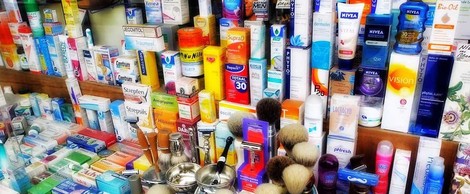Your podcast discovery platform
Curious minds select the most fascinating podcasts from around the world. Discover hand-piqd audio recommendations on your favorite topics.

piqer for: Global finds Doing Good
After ten years working in television news in Washington, DC, Geri quit the business to start a family and in 1997 founded GoodNewsNetwork.org, which quickly became the #1 site on Google for "good news". For more than 20 years, GNN.org has delivered positive news and inspiring stories from around the world as an antidote to the barrage of negativity in mainstream media. Featured on CBS News, BBC, Rolling Stone magazine, and NPR's All Things Considered, Geri was dubbed “The Good News Guru” by the Washington Post. From Health news to Heroes, World news to Animal rescues—and our new ‘Good Talks’ page, which aggregates the best motivational podcasts, GNN provides the ultimate grab bag of GOOD, with its daily dose of optimism and hope.
Cosmetics Contain Unsafe Ingredients: US Congress May Finally Take Action, Kardashian Pushes, Too
The cosmetics industry in the U.S. has been mostly unregulated over the past 80 years. While nearly 1,400 harmful ingredients are banned from personal care products in Europe, the US has eliminated only 30. That may be about to change.
A bipartisan bill to enact more protective laws governing that industry, the Personal Care Products Safety Act (S. 1113) introduced by Sen. Dianne Feinstein (D-CA) and Sen. Susan Collins (R-ME) last year, has gained at least 15 co-sponsors.
Even the Kardashian women are getting involved. Kourtney traveled to D.C. recently to push for the reform saying, “Everybody should have the right to healthy products.”
In a recent study, the levels of potentially hormone-disrupting chemicals in the bodies of teenage girls plunged in just three days after they stopped using certain cosmetic products, shampoos and soaps that contained phthalates and parabens, according to Kim Harley, Ph.D., a researcher with the Center for Environmental Research and Children’s Health at the University of California – Berkeley.
Research like this, along with recent trends toward healthier grooming products, has spurred consumers to look for natural, plant-based products.
This article details a number of those companies, and also lists well-known brands that still use phthalates and parabens in their formulations.
What's interesting is that some of the mega-brands voicing support for the legislation, like L’Oreal, Revlon, Proctor & Gamble, Johnson & Johnson, Unilever, and Estee Lauder, still currently use many of those ingredients in their products that have been banned in Europe.
The new call to consider more closely the effects of chemicals on consumers also has far-reaching benefits for the environment, similar to recent moves to rid personal care products of microbeads. The endocrine disruptors that are flushed into waterways have been suspected by EPA scientists as causing malformed frogs and mutations in fish.
